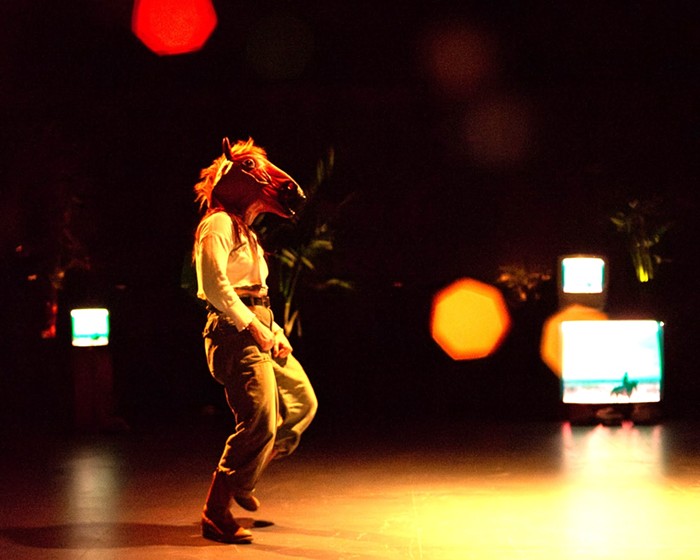
In Trigger Warning, her award-winning poem, Portland poet Jordan Wolmut dissects the concept of a slam poetry competition while taking part in one.
In the poem, Benson High School senior Wolmut recounts the traumas she’s experienced in her life—childhood abuse, and the death of her mother at 14—while weaving in observations about how slam poetry sometimes requires poets to retraumatize themselves on the stage. In Trigger Warning, she calls this “Reliving every pain possible to get all 10s” from the judges.
“Don’t you see me breaking?” the poem continues. “Don’t you see me shaking? The judges love that shit.”
Earlier this month, Trigger Warning earned Wolmut the top prize in the #Virtualandia! Youth Poetry Slam, a virtual version of Literary Arts’ annual Verselandia! competition for Portland high schoolers. It was Wolmut’s second time winning the competition; she first won in 2019. Wolmut has also competed as part of the Oregon team in Brave New Voices, an annual international youth slam poetry festival.
In fact, it was the Brave New Voices final competition in 2019 that inspired Wolmut to pen Trigger Warning. Wolmut tells the Mercury in a recent interview that while Brave New Voices typically includes trigger warnings for sensitive subjects before poems begin, some trigger warnings were accidentally omitted in 2019, prompting anger and hurt from some attendees. For Wolmut, the incident brought up ambivalent feelings about trigger warnings, and about how trauma functions in slam poetry in general.
After hearing some of the poems, Wolmut says, “I was crying, I was breaking down, but at the same time it was a relief. I heard a girl next to me crying about the same poem, and she was like, ‘That’s a poem I should’ve wrote a long time ago.’... A lot of people were crying, but it was also something they needed to hear.”
At that same competition, Wolmut observed some coaches telling the youth poets to display their trauma onstage: “‘You gotta feel it, you gotta break down,’” she remembers hearing coaches say. While members of the audience could expect to be protected by a trigger warning, poets were expected to perform their own trauma.
“When I wrote Trigger Warning, I was thinking about the poets onstage,” Wolmut says. “It’s really harsh, you know?... So that’s why I was like, ‘You’re not just watching me, you’re listening to me.’”
At the same time, Wolmut says that slam poetry has helped her work through her own trauma immensely, and that she’s found supportive people at every slam poetry competition she’s been a part of. She’s also seen how her own work can help others process their emotions.
“My friend had never been into poetry, never heard poetry, and he called me crying about my poem [Trigger Warning],” Wolmut says. “He was speechless. That’s the type of energy poetry gives.”
“Every time I perform a poem, it comes out differently.”
Wolmut first got into poetry while reading Shel Silverstein classics in grade school, mesmerized by how the poet “could twist words around in a beautiful way.” As she got older, she read books like Milk and Honey by Rupi Kaur: “My friend and I would always read it together, and it helped us express ourselves.” Wolmut says her writing process consists of jotting down disparate notes until eventually she can fit the pieces together.
Writing is only half of slam poetry, as the medium also requires a theatrical level of performance. But Wolmut says she rarely plans that part in advance.
“Every time I perform a poem, it comes out differently,” she says. “If I’m doing a personal piece, I just let it out, and however that comes, it shows.”
Audience participation can also play a role in the final product—something Wolmut says she missed this year, as all performances were pre-recorded and screened virtually, though she understands it was the safest option during the COVID-19 pandemic.
“I’m sad I didn’t have a crowd,” she says. “It’s a lot different when you can’t hear the reactions. Like, I have this poem in 2019 that was supposed to be a love poem, but it turned out kind of funny. The crowd started laughing, and as the poem was going on, I was like ‘Okay, I can see why they’re laughing, this is kind of funny.’ That was crazy.”
After her mother died when she was 14, Wolmut moved around to different family and friends’ homes in Portland. She says the friend’s home she’s in now is “probably the best place I’ve ever been—I’m surrounded by good energy, plants, people, everything.” She has a few scholarship offers for college next year, but she still hasn’t decided what the best option is for her. But she knows poetry will continue to be a part of her life, and that includes helping mentor other young people at future poetry competitions.
“Life is a rollercoaster for me,” Wolmut says. “A lot of my friends like to say my life is like a movie. I’ve got a lot to write about—that’s what I like to say.”



















